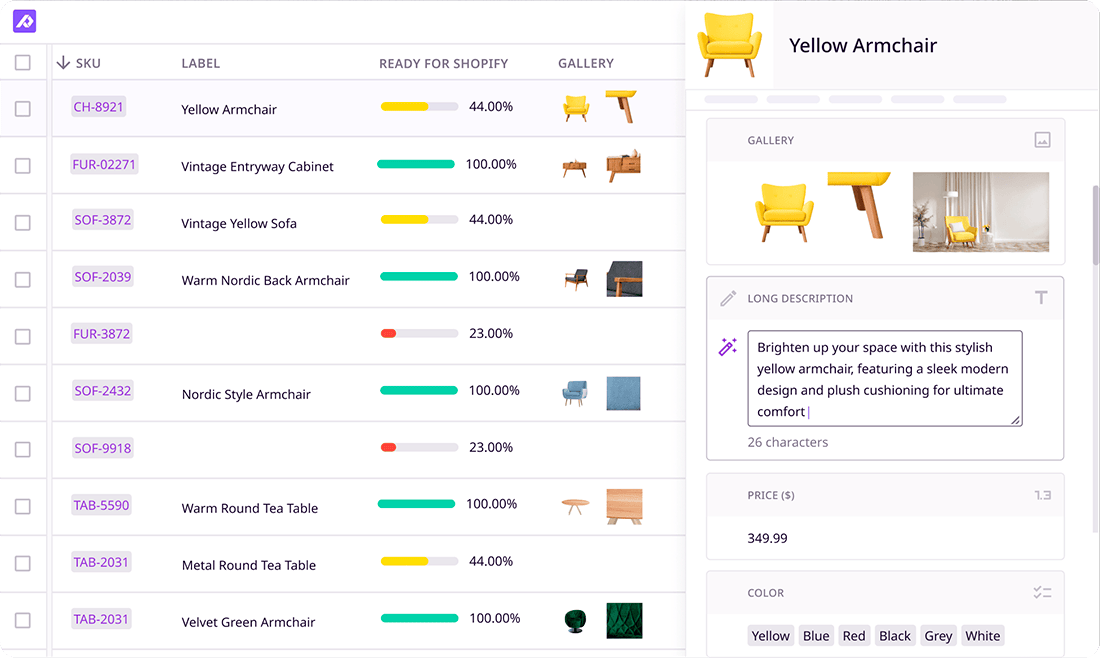
Keep the good stuff coming
Subscribe to our blog newsletter and get monthly content that helps you manage product data smarter.
No spam. Just real value.
So, you’re looking for a PIM software. And not just any PIM software—the best PIM software for your business in 2025.
Good news: you’ve come to the right place. Slightly less good news: despite the title of this blog, there’s no one-size-fits-all “best PIM” (great as we are, even we have to admit we’re not the best fit for everyone).
Whether you’re branching into new sales channels, wrangling a growing product catalog, chasing higher margins, or just struggling to keep all your product data up-to-date when it’s stored in spreadsheets, choosing the right PIM depends on a few key things: how much product information you’re managing, how many people are managing it, and how much you have to spend (to name just a few).
That said, don’t get discouraged—there is a right PIM out there for your business. One that’ll bring your team together, clean up all your product data, and actually help you grow. And we’re here to help you find it.
This guide is your need-to-know for the pros, cons, features, and selling points of the seven top PIM solutions on the market in 2025.
Before we dive into what PIM is right for you, there are a few things we should get straight first.
What is a PIM?
Let’s start with the basics: PIM stands for Product Information Management. At its heart, PIM is a centralized platform that helps businesses manage, optimize, and distribute accurate product data across multiple channels.
Think of a PIM as your product data HQ: a single source of truth where all your product information lives. With everything in one place, you can enrich your product data as a team, track what data you’re missing, and optimize for wherever you’re selling.

You can use PIM software to:
-
Manage all your product data and digital assets in one place
-
Make sure all your product data is up-to-date and improve data consistency
-
Optimize product data for all your sales channels
-
Send those different sales channels all the data and digital assets they need—automatically
Want to dig deeper? You can find everything you need to know about PIM on our website.
Key features to look for in a PIM
Now we know what a PIM is, let’s talk about what it does.
This is where things get interesting because, sure, every PIM will centralize your product data—but beyond that, features can vary wildly. Some tools come with all the bells and whistles. Others stick to the essentials.
Here’s the trick: you don’t need every feature. You just need the right ones. Choosing a PIM isn’t about picking the one with the longest feature list. It’s about choosing the one with the features that actually solve your problems.
You need to decide what actually matters to your business. Here are some of the core features to look out for in a PIM:
Flexible data imports
Make sure you can get your product data in. A good PIM lets you import product info via CSV, JSON, or XML, pull media from public URLs, and connect via API to your existing systems, like your Enterprise Resource Planning (ERP) system. Bonus points if it supports scheduled imports for automatic updates.
Robust attribute management
This is the bread and butter. Being able to create and manage unlimited product attributes—size, color, price, materials, descriptions, you name it—is essential to keeping your products organized and searchable.
Custom categories, relationships, and variants
A PIM should allow you to set up categories, subcategories, and product relationships that reflect how you sell. Variants, bundles, accessories—you need to be able to structure your catalog in a way that works for your business and makes sense to your customers.
Built-in Digital Asset Management (DAM)
Images, videos, spec sheets—your product data isn’t complete without the right visuals. A lot of PIMs come with built-in DAM features, but whether that’s enough for you depends on the size and complexity of your catalog.
Data validation and completeness checks
Make sure nothing slips through the cracks. Set custom rules to define what “complete” means for your products (e.g., must include a product description, image, and price), and instantly spot anything missing.
Product data syndication
Of course, you’ll also need to get your product data out of your PIM. Whether you're selling on Amazon, Shopify, or your own site, many PIMs allow you to format and send product data to each channel, exactly how they want it.
Still curious? This was just a quick overview. Check out our 23 PIM capabilities to look out for in 2025 for the full feature rundown.
PIM benefits: How a PIM improves your product data management
We’ve talked about what a PIM is and what it does. Now let’s get into why it matters.
Because yes, it’s great that a PIM can handle a million product attributes and connect to every sales channel under the sun. But at the end of the day, you’re here for the results. So here’s what a good PIM can really do for your business:
Free up your team to focus on growth
With centralized data, you free up your team to focus on the tasks that drive real value for your business (instead of manually updating product info or adding products to sales channels).
Launch products faster
90% of companies face delays when launching products, with product data often at the root of the problem. A PIM eliminates bottlenecks and accelerates your time-to-market to give your business a competitive edge.
Eliminate errors
86% of consumers wouldn’t make a repeat purchase from a brand that provided inaccurate product information. A PIM avoids that. It provides accurate, consistent, and up-to-date product data, everywhere you sell.
Collaborate with your team
With a shared platform, your team can update and approve content in one place for easier collaboration and faster decision-making.
Grow your business
As your business expands, a PIM scales with you, seamlessly handling new products, markets, and partners. It reduces friction, allowing you to scale quickly and maintain control over your data.
Deliver better product experiences
20% of consumers have abandoned their shopping cart because of poor product descriptions. Those lost sales are available with a PIM, which helps provide clean, complete product data and descriptions and a better product experience.
How to decide if a PIM is right for your business
If you’re reading this, product data management is probably already part of your job—and you might be wondering if it’s time for a PIM. Not every company does, but if your product data is getting out of hand—or holding you back—it might be time to level up.
Signs you need a PIM
Here are some classic signs it’s time to bring in a PIM:
-
You’re managing 100+ SKUs
-
You have multiple team members (10 or more) working with product data
-
You’re sending product information to multiple channels—like marketplaces, retailers, or ecommerce platforms
-
You collect product info from more than one supplier
-
You need to share accurate, up-to-date product data across different teams or departments
-
You’re seeing more errors, inconsistencies, or missing data in your catalog
-
You’re spending too much time checking, fixing, or reformatting product data instead of growing the business
If you’re nodding along to even one of these, a PIM could save you time, reduce errors, and make life a whole lot easier.
Still not sure? We’ve put together six quick questions to help you figure out if now’s the right time.
Psst: If you’re running a global operation with thousands of employees or managing over a million SKUs, you might be looking at a more advanced solution. In that case, a Master Data Management (MDM) tool might be a better fit—it’s like a PIM with extra layers of governance and control for enterprise-level data sprawl.
Tips for choosing the right PIM
Knowing you need a PIM is one thing. Picking the right one is another.
Before we dive into the top seven PIMs of 2025, here are a few tips to help you decide:
1. Start with your pain points
What’s slowing you down today? Messy spreadsheets? Endless back-and-forth between teams? Missing images or inconsistent pricing? Your biggest pain points should drive your must-have features.
2. Focus on the features that matter
Not every business needs a PIM with every bell and whistle. Decide what’s essential for you. For example:
- Do you need a built-in DAM to manage product images and videos?
- - Are you selling across lots of platforms and need powerful syndication tools?
- Is scalability a priority? Will your PIM need to grow with your catalog?
- Will you need a developer team to customize things, or do you want something user-friendly out of the box?
3. Think about your team
Who’s actually going to use this? A smaller team might benefit from a simple, easy-to-learn interface. A larger team might need user roles, workflows, and collaboration tools to stay aligned.
4. Check your tech stack
Make sure the PIM plays nicely with your existing systems. Whether that’s your Enterprise Resource Planning (ERP) system, ecommerce platform, or supplier portals, integrations can save you hours of manual work.
5. Plan for ROI (Return on Investment), not just cost
Some PIMs come with a higher price tag—but that’s not the full story. Factor in how much time you’ll save, how many errors you’ll avoid, and how much faster you can scale. That’s where the real value comes in.
What to look for when comparing PIM software
When you’re choosing the best PIM for your business, what do you need to know? That’s what we asked ourselves when we started putting together this list of the best PIMs for 2025.
We focused on the stuff that actually makes a difference when you’re trying to choose the right software:
-
Whose is it built for? Is it great for small teams or big operations?
-
Ease of setup: How simple is it to get started?
-
Pricing information: What does it actually cost?
-
Trial options: Can you test it before you commit?
-
Support: When things go wrong, is there someone there to help?
So, with that in mind, here’s how the top contenders stack up.
The 9 best PIM software providers of 2025
Heads up: We’ve listed these PIMs alphabetically, so don’t read too much into the order.
Akeneo

A PIM system built for large enterprises
Akeneo, with a high price point and a core system that allows you to purchase add-ons as needed, is definitely created for larger enterprises, rather than SMBs. The system is open-source, which means less tech-savvy users won’t be able to harness its potential and may be overwhelmed by the lack of structure.
Best for: Large enterprises with 500+ employees
Support: Ranked 8.8 / 10 by G2's Winter 2025 report
Setup time: 6 months
Free trial: Free trial available
Price: From $25,000/year
Key features:
-
Teamwork assistant: Assign user permissions like roles, tasks, and access levels. Great for large teams who need to work together on product data management.
-
Progress tracking dashboard: Lets you monitor product workflows when working as a team to make sure all tasks are completed on time for smoother operations.
-
AI-Powered content generation: Akeneo uses AI to help you generate, enrich, and translate product content.
inRiver

A product lifecycle PIM with built-in analytics
InRiver is a scalable PIM designed to grow with your business. It offers a comprehensive feature set, built-in analytics, and a flexible setup that can be tailored to your business needs. However, it comes with a steeper learning curve and one of the longest setup times in the market (often taking up to nine months to fully implement). That makes it more of a long-term investment, best suited for enterprise teams with the resources and time to get the most out of it.
Best for: Mid-sized or enterprise-sized businesses
Support: Ranked 8.1 / 10 by G2's Winter 2025 report
Setup time: 9 months
Free trial: No free trial available
Price: Not publicly available
Key features:
-
Channel Insights: Provides a self-service Digital Shelf Analytics (DSA) tool offering weekly updates on product visibility, pricing, stock status, and ratings across selected e-commerce sites.
-
Evaluate (inRiver’s data analysis tool): Provides real-time audits of product listings. It monitors content accuracy, keyword performance, stock levels, pricing fluctuations, and customer reviews, delivering actionable insights to improve your digital shelf presence.
Pimberly

A comprehensive PIM solution for mid-sized to enterprise businesses
Pimberly's comprehensive features and scalability make it a strong choice for businesses aiming to streamline their product data management across diverse channels. However, the investment and setup time may be more suitable for organizations with the resources to leverage its full potential.
Best for: Mid-sized or enterprise-sized businesses
Support: Ranked 9.1 / 10 by G2's Winter 2025 report
Setup time: 6 months
Free trial: No trial available
Price: From $30,000/year
Key features:
-
DAM: Pimberly offers DAM capabilities to organize, retrieve, and share files from a central library.
-
Workflows: Create workflows that notify users when new products are added or need updating and approve products before sharing them.
-
Catalog management: Create catalogs in multiple languages to share your products.
Pimcore

An open-source powerhouse for digital experience management
Pimcore is an open-source PIM that goes beyond product data—it’s a unified platform for managing content, assets, and digital experiences all in one place. It’s highly flexible and built for businesses that need control and customization across their digital operations. But with great power comes... the need for technical know-how. This one’s best suited to teams with development resources or larger enterprises that want complete ownership of their setup.
Best for: Large enterprises with 500+ employees
Support: Ranked 9 / 10 by G2's Winter 2025 report
Setup time: 6 months
Free trial: Free trial available
Price: From $1,550/month
Key features:
-
Integrated Translation Management System (TMS): An enterprise-grade translation system that translates product content into multiple languages automatically.
-
Data quality management: Pimcore gives you built-in tools to validate and clean your data.
-
Digital Asset Management (DAM): Pimcore's DAM system centralizes the management of digital assets like images and videos, supporting over 220 file types.
Plytix

A powerful (but seriously easy to use) PIM that won’t blow your budget
Plytix was built to give small and mid-sized businesses the tools they need to compete with the big players (without the complexity or the cost). It combines everything you need to manage, optimize, and share product data in one affordable, easy-to-use platform. And with real humans on standby to help, you’re never on your own.
Best for: All businesses, big or small (but with a focus on SMBs)
Support: Ranked 9.8 / 10 by G2's Winter 2025 report
Setup time: Less than 1 month
Free trial: Free trial available
Price: From €699/month
Key features:
-
Digital Asset Management (DAM): Keep all your digital assets and product data together in one place with digital asset management.
-
Sales channel syndication and data sharing: Send product content to different retailers, marketplaces, and other platforms via live product feeds. You can also share it via branded, digital product catalogs that automatically fill with product data from your Plytix account.
-
Computed attributes: Use formulas to automatically transform data (like adding tax, applying discounts, or changing currencies).
-
Product completeness tracking: Easily see if a product has all the information it needs and, if not, what’s missing. Set rules for what qualifies a product as "complete" or “ready” (e.g., requires an image, a product description, and pricing data).
-
AI-powered features: Plytix uses AI-enhanced features to lighten your workload, for example, by writing product descriptions for you, editing and enhancing images, and automatically matching products and attributes.
Quable

A user-friendly PIM with robust features for SMBs
Quable is designed with ease of use in mind, making it a good fit for small to medium-sized businesses looking to get up and running without a steep learning curve. Their App Library offers out-of-the-box connections to sales channels, too. However, if you're planning to expand into multiple regions or scale up operations quickly, you might need something more advanced.
Best for: Small to medium-sized businesses (SMBs)
Support: Ranked 8.1 / 10 by G2's Winter 2025 report
Setup time: 5 months
Free trial: No free trial available
Price: From $1,600/month
Key features:
-
DAM: Quable offers DAM capabilities with a customizable media library to organize your digital assets by type or use.
-
Analytics: Analyse product quality and completeness across your sales channels with built-in analytics tools.
-
Workflow management: Create workflows with different user access rights, customizable workflows, and the ability to set up rules like automatic reminders when users need to make an update to a product.
-
Quable Apps (plug-and-play sales channel connectors): Whilst they don’t directly connect to sales channels themselves, Quable offers a library of connectors (like the Shopify Plus Connector) to help you get your products onto your sales channels.
Sales Layer

A flexible PIM with syndication features
Sales Layer is a solid PIM and product management experience for mid-sized businesses. It offers a balance between usability and functionality: they don’t offer the advanced features of a PIM like Salsify, but they do offer some marketplace connections (which will suit mid-sized businesses) as well as reliable data management tools.
Best for: Mid-sized or enterprise-sized businesses
Support: Ranked 9.4 / 10 by G2's Winter 2025 report
Setup time: 3 months
Free trial: Free trial available
Price: Not publicly available
Key features:
-
Instant catalogs: Generate product catalogs that match your sales channels or retail partners' requirements.
-
Plug-and-play integrations: Connect to a variety of sales platforms and marketplaces using pre-built integrations.
-
Reporting tools: Identify inconsistencies or errors in product data with built-in reporting tools, including the option to export or print reports for internal use.
-
Product enrichment tools: Edit attributes like tags, families, and statuses across all products and channels. Includes support for translating product descriptions into 156 languages.
Salsify

A feature-saturated, cloud-based solution
Salsify is a cloud-based PIM software. It offers a pretty intuitive user experience that makes it simple to create a product and push it to marketing and sales channels. It has one of the longest lists of additional features of al the PIMs we’ve looked at, plus you can get a 30-day free trial period, which allows you to try out this solution before you commit to its very hefty price tag.
Best for: Large enterprises with 500+ employees
Support: Ranked 8.9 / 10 by G2's Winter 2025 report
Setup time: 4 months
Free trial: Free trial available
Price: From $2,000/month
Key features:
-
Automated workflow management: A no-code workflow builder to create and manage custom workflows for different tasks (like content creation, review, and approval) as well as an integrated task workspace to automate and govern essential go-to-market tasks.
-
Data quality enforcement: Salsify uses AI to make sure your product data stays consistent and accurate across multiple sales channels by enforcing structured data standards.
-
Analytics: Built-in analytics tools allow you to track how your product content is performing across all your sales channels and identify areas for improvement.
Syndigo

A content syndication hub for large enterprises
Syndigo keeps the focus on data management, syndication, and analytics. Serving thousands of manufacturers and retailers across industries like grocery, automotive, and healthcare, Syndigo is built for large enterprises with complex distribution needs (but note that there’s no free trial available to get a hands-on feel before you commit).
Best for: Large enterprises with 500+ employees
Support: Ranked 9.5 / 10 by G2's Winter 2025 report
Setup time: 4 months
Free trial: No free trial available
Price: Not publicly available
Key features:
-
Master data management: Keep product data organized, consistent, and ready to go across every channel.
-
Performance insights: Built-in analytics and feedback tools show you what’s working—and what’s not—so you can fine-tune your content for better results.
-
Vendor health scores and real-time alerts: Track the accuracy and completeness of your product data and get instant updates when your product information needs fixing.

Wrapping it up
Choosing a PIM isn’t always straightforward. There are a lot of questions to answer (like “who’s going to use it—just marketing, or sales and IT too?” or “do you really need all those features, or just a few that actually make life easier?”). The point is: it’s a big decision. But it’s also an important one. Centralized data management means better data accuracy, faster processes, and a smoother path to growth.
If you’ve made it this far, you’re already ahead of the curve. You’re doing your research, asking the right questions, and getting clear on what matters for your business when it comes to data management. That’s how you make a smart decision.
What to do next
Whether the right PIM for you is on this list or not, here’s what we’d recommend doing next:
- Talk to your team—figure out who’s going to use the tool, and what they need from it
- Build a shortlist of must-haves vs nice-to-haves
- Outline your use case(s)—what problems are you trying to solve?
- Write down your top questions to ask every vendor
- And once you’re ready, start booking demos
And hey, don’t be shy about reaching out to us. We know the PIM world inside out. We’re happy to talk through your needs, share what we’ve learned, and even point you to another provider if we’re not the right fit. No pressure, just honest advice.
Frequently Asked Questions
The "best" PIM (Product Information Management) software really depends on your specific needs.
However, Plytix PIM stands out for its user-friendly interface, comprehensive feature set, and scalability, making it a great option for brands and retailers of all sizes. It allows for easy management of product information across multiple channels, making it a top choice for businesses looking to get their products out to market faster.
PIM is incredibly beneficial for managing large amounts of product information efficiently. It helps businesses centralize product data into a single platform, simplifying the process of distributing this information across various sales channels, websites, and marketing platforms.
This leads to improved data accuracy, consistency, and a faster time-to-market for products. Essentially, PIM is a lifesaver for any commerce business looking to improve their product information management process.
PIM stands for Product Information Management. It is a type of software that helps businesses manage a wide range of product data (such as descriptions, specifications, images, and pricing information).
PIM systems serve as a central hub for all product information, making it easier to distribute this data across multiple channels and platforms. The goal of a PIM is to improve efficiency, data quality, and consistency across your business.
An example of PIM software is Plytix PIM. Plytix offers a cloud-based platform where businesses can manage, optimize, and distribute their product information from one place. It allows users to create a centralized source of truth for their product data, which can then be shared with ecommerce sites, retail partners, and marketing materials.
Features such as digital asset management and product data syndication make Plytix a great PIM solution for online businesses.

Beth Batley
Beth Batley is a SaaS storyteller with a background in marketing. Now immersed in the software world, she works with B2B and ecommerce companies, writing about (sometimes) complex software in a way that’s straightforward and actually connects.

What if your product data actually worked for you?
We’ll show you how Plytix helps you stop fixing data—and start using it.
Related posts
Keep the good stuff coming
Subscribe to our blog newsletter and get monthly content that helps you manage product data smarter.
No spam. Just real value.



Think others should see this?
Go ahead and share it.